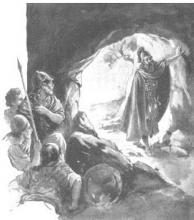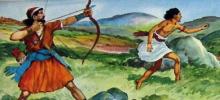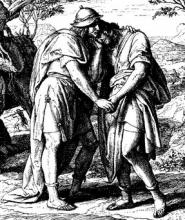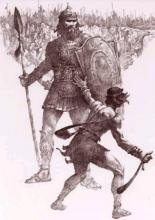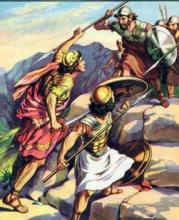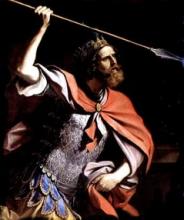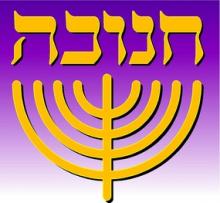David the King: Confrontation at En-Gedi
It's easy to see biblical texts as being a glorification of war. There are dozens of instances of God telling various leaders to bring the sword to one enemy or another. There are many layers to this theme, but it should be noted that Judaism now and in its most ancient form has never called war a good thing. More to the point, these texts never encourage us today to seek conflict. In the book of First Samuel there is a lot of fighting. It is a text that came from a period of near constant conflict. As such it is important to look at the moments when violence is averted and the message those moments are designed to convey.
For several weeks now our analysis of First Samuel has revolved around David fleeing from Saul. Despite being the greatest military commander ever described in the Torah, David never even considers marching against Saul. We watch him win every battle he ever fights, including one in Chapter 23 when he rescues the town of Keilah from Philistine raiders. Yet David keeps his men in the wilderness, hiding in mountain caves and relying on the charity of locals for sustenance.
In this period, David is a sort of Robin Hood figure. While King Saul is busy trying to protect his throne from David (even though David doesn't have any designs for it), the country suffers. Keilah, as it's described in the text, is a center for cattle in Judah. Historically the town was located at the southern end of the country and would have been considered the backwoods of the kingdom. Even when David liberates Keilah from the Philistines, the people of the town are willing to give him up to Saul. This isn't because they're particularly bad people. If that were the case there would probably be some divine retribution in the text. But because the people of Keilah aren't chastised for turning on their protector, this passage can be read as a simple people trying not to get caught in the middle of a major political struggle.
In a wonderful literary twist, the real confrontation between David and Saul doesn't happen on the battlefield, but in a personal moment of shared vulnerability. After an untold amount of time of dashing back and forth fighting Philistines and pursuing David, Saul unknowingly stumbles upon the very cave where David is hiding. It is in a region called En-Gedi, a rocky region on the Dead Sea that is unsuitable for permanent settlements. The area has many caves, so it's ideal for David and his contingent. They hide so deep in the caves that Saul's men might not go far enough to actually find them.
In fact, that's exactly what happens. This particular scene is difficult to read because it uses an ancient euphemism, "to cover one's feet", which obliquely refers to going to the bathroom. Saul enters a cave alone to "cover his feet" and it just happens to be the same cave where David is hiding. To do his business Saul removes his robe, making him especially vulnerable. David, against the wishes of the men standing with him, decides not to ambush and kill Saul. Instead, he quietly slices a bit of fabric off his robe.
In the moment that follows, David talks to Saul in the dark, telling him that he could have killed him but chose not to. David's reasoning for this is that Saul is still technically anointed by God, so it would be a sin to kill him regardless of what Saul has done to David. Of course, the sliced robe is definitely a warning, as if to say, "I didn't kill you today, but I could have."
The lesson of this passage comes straight from David's lips. He recites the proverb, "Out of the wicked comes wickedness", a sentiment that closely reflects the modern proverb "Violence begets violence". David, whether he knows it or not, is proving that he is fit to be king in this age of war precisely because he knows when to stop fighting. He'll fight the Philistines when they invade, but he won't fight his own people, even when they stand against him. It's at this moment that Saul realizes just why David is meant to replace him.
